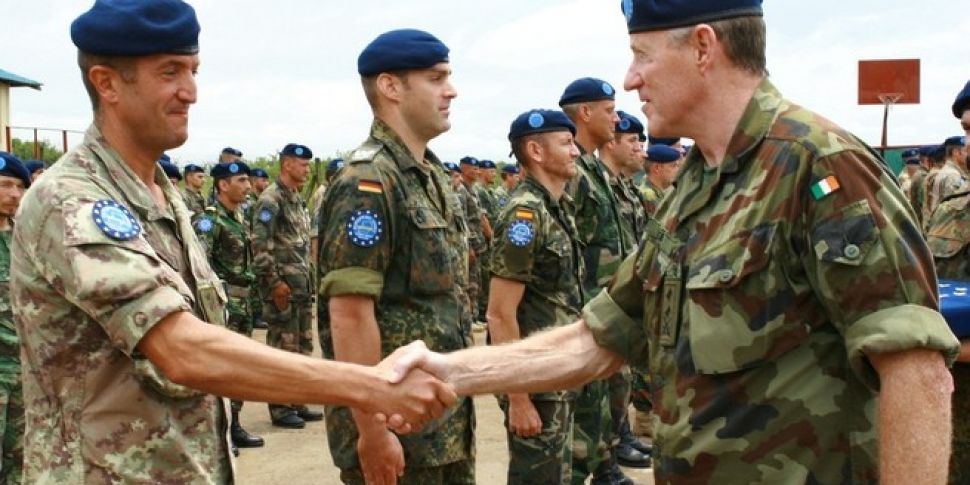Plans for a supranational European Army were part of some of the 'founding fathers' (as the EU calls them) vision for a unified Europe.
This issue came into focus in the wake of the USSR’s involvement in the Korean War in 1950. Fearing possible conflict in continental Europe, a number of prominent political leaders rallied around the idea of a European Army.
In an address to the Council of Europe, Winston Churchill called for "the immediate creation of a unified European Army subject to proper European democratic control."
The formation of a European army was also a dream of the first President of the European Coal & Steel Community, Jean Monnet, who was dubbed the 'father of Europe.' He prepared proposals for the creation of a European army in the 1950s which were ultimately defeated by France's National Assembly due to concerns over France's future sovereignty.

PA
Fast forward to 2016
As Russia flexes to the east, and Europe faces both a migrant crisis and the lingering threat of attack from jihadists, the topic of a possible future European unified military force is again being discussed.
In March of last year, European Commission President Jean Claude Juncker said that the creation of an EU army would lead to the Union being taken more seriously by Russia.
"Europe’s image has suffered dramatically and also in terms of foreign policy, we don’t seem to be taken entirely seriously," he said in a newspaper interview.
"But a common army among the Europeans would convey to Russia that we are serious about defending the values of the European Union," he continued.

PA
"You would not create a European army to use it immediately,” the Luxembourger explained, before adding, "A common army among the Europeans would convey to Russia that we are serious about defending the values of the European Union."
Power
Europe’s two most influential nations, Germany and France, are spearheading a new movement to create greater military co-operation across the continent.
A policy document by French and German officials says that it is "high time to strengthen our solidarity and European capacities in defence, to more effectively protect our borders and EU citizens, and to contribute to peace and stability in our neighbourhood."
It continues, "The EU has the unique ability to use and combine military and civilian instruments. Ideally this should be reflected in the process of strategic and operational planning of missions and operations."
During Mr Junker’s ‘State of the Union’ address yesterday, he said, "We must have a European headquarters and so we should work towards a common military force."

PA
His main focus was the creation of a centralised EU command and control facility to allow individual European military forces to avoid double-jobbing and to share resources.
European militaries are already working together within the EU’s Common Security and Defence Policy (CSDP) which takes part in peace keeping and conflict prevention missions. A physical headquarters would cut down on the cost and disruption of officials meeting at different locations across the continent.
The second part of the statement referring to a unified "military force" is more problematic. The Commission President reasons that no one EU state has the resources to deal with either Russia or extremism within the Europe’s borders - so nations need to work together.
Backlash
The proposals are expected to be discussed when the leaders of EU nations (excluding the UK) meet in Bratislava on Friday, September 16th.
It is expected to draw immediate opposition from Lithuania, Latvia, and Estonia according to The Times (London) - while it also reports that Poland will silently support opposition to the proposed greater military integration.
"We take a very sceptical view on the idea or creation of an EU army. I really do not see any value for the European army ... We do not see the mechanism on how you make decisions on the deployment of an EU army. The European Parliament? We are not at a point where national parliaments would be willing to authorise this," Latvian foreign minister Edgars Rinkevics told the British newspaper.

PA
The creation of a EU army was cited as a reason to leave the Union by a number of the 'out' campaigners during the Brexit debate. After Juncker's speech yesterday, the UK Independence Party (UKIP) asserted that his comments equated to an 'admission' that an EU military force is "happening."
Opposition to a possible EU army has voiced by Euro-skeptics in Ireland during the referendums on the Nice and Lisbon treaties.
The Rules
The bottom line is that an EU army could not be formed without the support of all member states - this is stated in Article 42 of the Lisbon Treaty.
However - there are provisions for member states to collaborate of defence without the support of other nations - meaning that France and Germany could move forward with allies to combine military resourses - while those who object to the move do not take part.
Politicians from Italy and Hungary have indicated their support for greater military co-operation.
For some politicians, the overall goal is to have a European military force which is strong enough to take action without requiring the support of the US.
Frank-Walter Steinmeier, the German foreign minister told The Times that, "The way to a European army is far away. But the way ahead is something that is important. Our populations are expecting closer cooperation in the field of security, including defence."

Military.ie
Ireland and EU missions
The Irish army currently takes part in EU peacekeeping, crisis management and reconstruction efforts in troubled regions.
The Department of Foreign Affairs states that, "During the course of the evolution of the EU’s common security and defence policy, our EU partners have always fully respected Ireland’s sovereignty, independence and neutrality."
It adds that Irish troops are not employed to conflict zones on EU missions without the "triple lock" of approval from the UN, the Government, and the Dáil.









